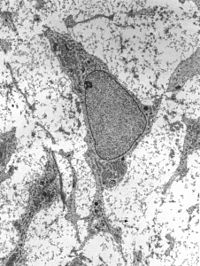
Photo from wikipedia
Bone marrow mesenchymal stem cells (BMSC) can ameliorate ischemic injury of various tissues. However, the molecular mechanisms involved remain to be clarified. In this study, we intend to investigate the… Click to show full abstract
Bone marrow mesenchymal stem cells (BMSC) can ameliorate ischemic injury of various tissues. However, the molecular mechanisms involved remain to be clarified. In this study, we intend to investigate the effects of BMSC‐derived conditioned medium (BMSC‐CM) on hypoxia/reoxygenation (H/R)‐induced injury of H9c2 myocardial cells, and the potential mechanisms. Cell injury was determined through level of cell viability, lactate dehydrogenase (LDH) release, total intracellular reactive oxygen species (ROS), mitochondrial membrane potential (Δψm), and cell apoptosis. Autophagic activity of cells was detected through levels of the autophagy‐associated proteins and autophagic flux. Results showed that BMSC‐CM alleviated H/R‐induced injury in H9c2 cells, as demonstrated by increased cell viability and Δψm, decreased ROS production, LDH release, and cell apoptosis. Furthermore, the H/R treatment induced a decrease in autophagic activity and an increase in Notch2 signaling activation in H9c2 cells. In the presence of BMSC‐CM, the autophagic activity impaired by the H/R treatment was upregulated with decreased phosphorylation of mTOR, and the activation of Notch2 signaling was downregulated. These effects of BMSC‐CM could be replicated by Notch signaling inhibitor. In contrast, inhibitors of cell autophagy including chloroquine (CQ) and 3‐methyladenine, diminished the protective effects of BMSC‐CM. Taken together results, our study showed that BMSC‐CM could protect H9c2 cells from H/R‐induced injury potentially through regulating Notch2/mTOR/autophagy signaling. These findings may provide a novel insight into the mechanisms of BMSC‐CM in therapy of myocardial ischemia/reperfusion injury as well as other ischemic diseases.
Journal Title: Journal of Cellular Physiology
Year Published: 2019
Link to full text (if available)
Share on Social Media: Sign Up to like & get
recommendations!